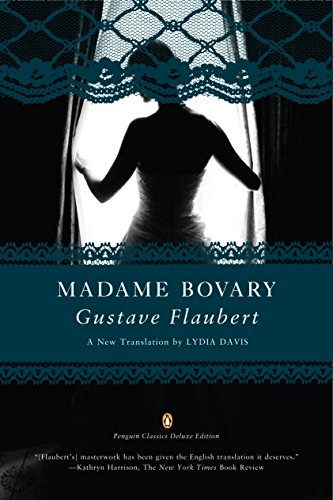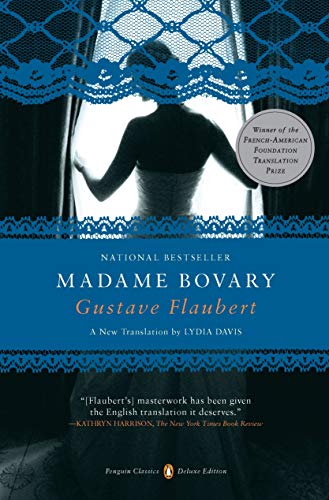If you’ve ever daydreamed about a life fancier than your own and then fallen flat on your face (like me, trying to do yoga for the first time), you’ll feel right at home in this review of Madame Bovary. Flaubert’s classic follows Emma, a woman with more romantic dreams than common sense, and trust me, there’s plenty of juicy drama, gossip, and eye-rolling poor choices. I’ve read this book, talked about it with friends over too much coffee, and I’m here to spill both the good and the not-so-good in a way even your lazy dog would understand. Let’s get to the heartbreak, the beautiful writing, and why Yonville’s gossip might just make your own neighbors seem tame.
In a nutsheel
Madame Bovary is a classic French novel by Gustave Flaubert. If you like drama, romance, and a healthy dose of frustration, this one checks all the boxes. The book falls under the genre of literary fiction, with some suspense and a sprinkle of scandal for good measure.
The story follows Emma, a young woman living in a small town, who tries to make her life more exciting. She wants romance and adventure, but small-town life keeps handing her soggy bread when she’s dreaming of fancy cake. Flaubert pokes fun at social expectations, marriage, and daydreaming—showing how reality sometimes squashes our biggest hopes. The book is clever, sharp, and a bit tragic, but never boring.
If you’re after a classic that lets you laugh, cringe, and maybe even question your life choices, Madame Bovary is a good pick. Just don’t blame me if you end up yelling at the main character a few times.
Emma Bovary: Dreams, Drama, and a Whole Lot of Trouble
Let me tell you, Madame Bovary is the ultimate cautionary tale, and Emma Bovary is right at the heart of it. She’s got dreams bigger than my neighbor’s backyard pool—and just as likely to spring a leak. Emma marries Charles Bovary, a pretty dull doctor, thinking she’s stepping into a life of adventure and fancy parties. Spoiler alert: she isn’t. Instead, she finds rural life about as much fun as watching paint dry, and she starts wanting more. A lot more.
Emma’s biggest flaw is that she always wants what she doesn’t have. She reads all these romance novels (I once read a romance novel in a dentist’s waiting room—ended up with a toothache and a headache), so she expects her real life to be packed with steamy affairs and dramatic gestures. Real life lets her down, so she goes looking for excitement in all the wrong places. Affairs, shopping sprees, piles of debt—it’s like she’s playing a game of “how-to-make-bad-decisions bingo,” and she’s winning big time. You might say she’s the original shopaholic, only with less internet and more scandal.
But here’s the kicker: she never really learns. Emma blames everyone and everything but herself. Charles is too boring, her lovers don’t love her enough, and society is just so unfair. I could say she needed a good friend to steer her straight, but who am I kidding? She wouldn’t have listened anyway. Up next, let’s chat about Flaubert’s writing style—it’s almost as dramatic as Emma’s life choices, but with way fewer shopping bags.
How Flaubert Makes His Words Dance in Madame Bovary
I have read a lot of books, but let me tell you, Gustave Flaubert’s writing in Madame Bovary is like a really fancy meal. Not the sort that gives you food poisoning, but the kind where you wonder if you look silly eating it. The man did not mess around with sloppy sentences. It’s clear that Flaubert cared more about picking the right word than I care about picking the right shoes—and trust me, I have left the house with two left sneakers more than once.
One thing that stands out is how Flaubert paints pictures. His descriptions are so sharp you can almost smell the stale bread and see the muddy boots. His language is simple, but not basic. He never uses ten words when four will do. And yet, there’s this rhythm to his phrasing that almost feels like poetry. I kept reading bits aloud to my friend Larry, who said it sounded better than his high school love letters. No offense, Larry.
Now, it’s not all roses. Sometimes Flaubert’s attention to detail, like describing the way dust sits on a curtain, gets a bit much. I found myself shouting at the book (sorry, neighbors) to get on with it. Still, you can’t deny the guy’s got style—every sentence fits together like a really good puzzle.
And now, dear reader, hold onto your hats, because next I am going to spill the tea on all the juicy themes of romance and disappointment that run wild in this story.
Themes of Romance and Disappointment in Madame Bovary
If you love romance and heartbreak (or even if you just enjoy cringing at other people’s bad decisions), Madame Bovary serves a banquet. Romance steams out of this book like fresh bread out of a Parisian oven. Emma Bovary, our main character, wants the kind of love that makes your knees weak and your wallet weep. She reads romantic novels, dreams of grand gestures, and expects her real-life love story to be just as exciting. Spoiler: it’s not.
This book swings hard at those who think love will solve every problem. Emma’s idea of romance is like a balloon at a porcupine convention — doomed. She’s always searching for something bigger, better, and more passionate than what she has. The disappointment hits her (and us readers) over and over. Her real marriage to Charles is kind of like soggy toast. Charles, bless his clueless heart, tries his best but is about as romantic as a loaf of bread. Emma’s search for excitement leads down some questionable roads, with affairs and wild spending sprees, but disappointment always calls her home.
Flaubert does not hold back. He shows us that happiness and the romantic fantasy of ‘happily ever after’ rarely match real life. The grass always seems greener for Emma, and by the end, she’s standing in a mud puddle. Even as you want to shake her by the shoulders, you’ll probably feel a little sorry for her too—because who hasn’t had shiny dreams that turned out to be duds?
Now, buckle up, because next we’re heading straight into the heart of the French countryside, where gossip is quicker than a buttered snail and the setting might just steal the show.
The Buzz and the Bustle: French Village Life in Madame Bovary
Now, let’s take a little stroll down the muddy streets of Yonville, the village where all the action (and inaction) of Madame Bovary happens. If you think small towns are quiet, let me tell you, this place hums louder than my Aunt Patty at a bake sale. You can’t sneeze without the whole village talking about it—and maybe writing a letter to your mother. Flaubert paints Yonville so well that I could almost smell the bread, hear the horses, and taste the judgment. It’s like being trapped in a group chat you can’t mute.
The setting does more than provide a backdrop for Emma Bovary’s messes. It’s the invisible character, always around, pouring more fuel on every fire. Gossip in Yonville travels faster than a rumor at summer camp. Emma’s smallest mistakes become headline news. Even the pharmacist, Homais, can’t help but talk (and talk, and talk). When people get bored, they just stir the pot—everyone is both judge and jury. I laughed at how everyone seemed to know everything, but I also felt a little bad for Emma. Privacy? That’s not on Yonville’s menu.
All said and done, if you’ve ever wondered what small town life in 19th-century France is like—or if you just enjoy a good gossip fest—Madame Bovary delivers. So yes, despite all the nosy neighbors and muddy streets, I recommend this book. Just be ready for everyone to know your business, even if you’re only reading it on the bus.
Conclusion
Well, there you have it folks, that wraps up my review of Madame Bovary. If you enjoy drama, romance gone wrong, and a main character who always thinks the grass is greener somewhere else, this is your book. Flaubert’s writing is sharp, his small-town setting is full of juicy gossip, and poor Emma Bovary makes choices that will have you shaking your head (and maybe laughing, if you’re cruel like me). It’s not always a happy ride, but it’s a classic for a reason. There are slow spots and sometimes Emma’s self-pity gets old, but the writing keeps things fresh. I recommend this novel if you’re up for a smart, dramatic, and honest look at chasing dreams—with just the right amount of scandal. Thanks for joining me—and remember, at least your love life can’t be as messy as Emma’s!



